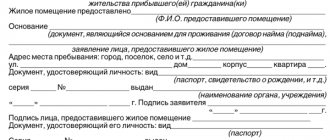STEP-BY-STEP INSTRUCTIONS – continued:
…Go ahead.
Buying an apartment in which a minor child certainly adds headaches to the Buyer. Nevertheless, this issue is completely solvable.
“Children are the flowers of life,” said one famous literary character. True, not every realtor will agree with him.
Real estate transactions involving minor children are among the most risky (from the point of view of possible challenge) in real estate practice. A particular risk here is that if the transaction is challenged, the court often takes the side of the minor , and may invalidate the transaction if it considers that the child’s rights have been violated or not properly respected.
But the Buyer, of course, should not immediately run away from there when he sees children in the apartment.
You need to panic calmly! We just need to know how to protect ourselves from this type of risk - from violation of the property rights of minors (for more information about these rights, see the link in the Glossary). For what reason may Rosreestr suspend the registration of an apartment purchase and sale transaction - see the link.
A serious protection for us here is an additional document - permission from the Guardianship and Trusteeship Authorities to conduct a transaction with an apartment with the participation of a minor . If the Seller has such a certificate and fulfills the conditions specified in it, the Buyer is protected from violation of the rights of minors .
Minors , relatively speaking, are of two types - up to 14 years of age (minors, they do not sign contracts), and from 14 to 18 years of age (they sign the contract themselves, but only together with the signature of a parent or guardian).
When buying an apartment with a minor child, the child himself may be:
- the owner of the apartment (have a share of ownership in it), or
- not to have property in it , but to be “registered” there.
In the first case, the child becomes a party to the transaction (permission from the Guardianship Authorities is required), in the second case, he is NOT a party to the transaction, but belongs to the category of so-called “third parties” whose rights may be affected as a result of the transaction with the apartment. In the second case, permission from the Guardianship Authorities is required only if the child is left without parents and/or is under guardianship or trusteeship. For more information on this, see the Glossary: “Rights of minor children in an apartment.”
What risks does the Buyer face when purchasing an apartment received by inheritance? Examples, explanations, recommendations.
A written request to the Guardianship and Trusteeship Authorities for such permission must come from the parents or legal (i.e. appointed and having the appropriate documents) guardians/trustees of the child, whose rights to the apartment must be taken into account when making the transaction. Parents will also need to collect a certain package of documents for “Guardianship”.
♦ Package of documents for obtaining permission for “Guardianship” ♦ (Click! And a pop-up window with a list of documents will open)
the Guardianship Authorities together with the Seller and ensure that permission is received.
A special employee of the Guardianship - an inspector - accepts documents, talks with parents and prepares permission for the transaction. Permission or refusal from the Guardianship and Trusteeship Authorities is usually received within 2 weeks. If a refusal is received, you can again contact the Guardianship Authorities with a request to indicate under what conditions it will be possible to obtain permission from them.
The refusal can also be challenged in court, but the Buyer is unlikely to wait for this.
You can read more about obtaining permission from the Guardianship and Trusteeship Authorities for a real estate transaction in a separate note at the link.
What to do if the sellers do not check out of the sold apartment? See this post at the link.
Is it possible to buy real estate for a person under 18 years of age?
Currently, parents have the right to purchase real estate for their children who are under 18 years of age . The right of ownership in terms of acquiring and owning property is not limited by the age of citizens. This is a completely legal right that is granted to citizens of the Russian Federation in accordance with the provisions of Article 35 of the Constitution of the Russian Federation and Article 17 of the Civil Code of the Russian Federation.
The only restriction for persons under legal age is the procedure for registering real estate (Article 128 of the Civil Code of the Russian Federation).
The problem is that you not only need to buy an apartment, but also go through the registration process, in accordance with the provisions of Article 131 of the Civil Code of the Russian Federation and Federal Law No. 218 of July 13, 2015.
Therefore, the procedure must be organized so that the entry of the transaction and the inclusion of the minor in the register of owners takes place in accordance with all the rules.
You can find out what you need to know when purchasing here.
Main features and differences from a standard transaction
The main difference between this type of transaction is that the child has the right to own the apartment, but is not authorized to complete the transaction. Therefore, the authority to complete the entire procedure passes to their legal representatives. Such legislative norms are provided for in Article 26 of the Civil Code of the Russian Federation and clause 3 of Article 60 of the RF IC.
Reference! The legal representatives of minors are parents, adoptive parents or guardians (up to 14 years of age), trustees (from 14 to 17 years of age inclusive).
For such representation, a notarized power of attorney is not required, as is the case in standard situations. The powers of the representative are certified:
- Passports of parents and birth certificates of children, in which the representative citizens are entered as parents (adoptive parents).
- If the information about the parents did not change during adoption, a court decision on adoption is presented.
- Guardians and trustees present a decision from the guardianship and trusteeship authorities.
The registration procedure differs depending on the age of the child. But the basic rules, universal for all age categories, require that the future owner appear in the contract as a party to the transaction, and his legal representative is indicated as “acting in the interests of”, indicating the degree of relationship and authority to represent.










